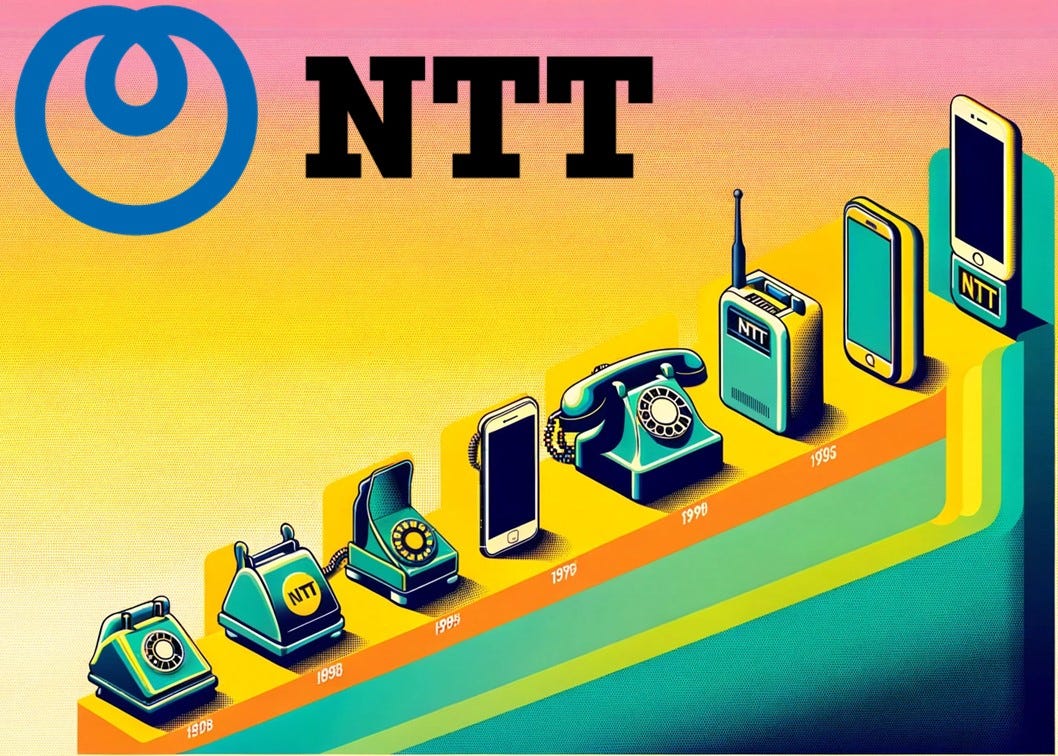[Stock Analysis] NTT (9432): Poised for a Global Comeback Amid Regulatory and Financial Shifts
Please note: This article is for informational purposes only and is not intended as investment advice. The mention of specific stocks is not a recommendation to buy or sell any securities.
Executive Summary
Cutting-Edge Technology: Nippon Telegraph and Telephone’s (NTT) investment in the Innovative Optical and Wireless Network (IOWN) sets it apart in the telecom sector, with the potential to revolutionize data center operations and AI-supported systems.
Strong Market Positioning: Compared to SoftBank's diversified venture capital investments, NTT's reinvestment in core technologies offers more consistent growth potential. NTT's focus on technological innovation may give it an edge over SoftBank, which risks diluting its core business focus.
Competitive Valuation: NTT's PE ratio of 12.3x is significantly lower than the industry average of 18.3x, indicating an undervalued position with potential for re-rating closer to peers, especially given its growth initiatives.
Growth Outlook: With the global data center market projected to grow at a 13.5% CAGR and NTT’s data center business expected to see a 26% revenue CAGR (FY 2020-2023), NTT is well-aligned with high-growth markets.
Law Could Destroy NTT’s Global Ambitions: The failure to repeal the so-called NTT law could force NTT to abort their overseas expansion plans.
Why NTT is Interesting Now
Nippon Telegraph and Telephone Corporation (NTT), with its origins dating back to the early 20th century, has grown from a Japanese state-owned enterprise into an influential player in the global telecommunications arena. It was privatized in 1985 and made the largest stock offering at that time.
However, in the 1990s, NTT faced challenges that dimmed its luster. The rapid advancement of technology and the emergence of competitive global players, along with Japan's economic stagnation during the 'Lost Decade,' hindered its growth. Despite these setbacks, NTT is now showing signs of a comeback.
The company has set an ambitious goal to boost its EBITDA from JPY3,290 billion in fiscal 2022 to JPY4 trillion by FY 2027, underpinned by significant investment plans. Specifically, NTT plans to inject JPY1.5 trillion into its data center operations over the next five years, targeting a substantial increase and global expansion. On top of that, NTT is on its way to develop Innovative Optical and Wireless Network (IOWN) technology that will give them an incredible competitive advantage.
This strategic focus aligns NTT with the surging global demand for data center services, projected to grow at a CAGR of 13.5% from 2020 to 2028.
Recent Developments and Growth Potential
NTT's recent shareholder-friendly initiatives have drawn considerable attention. The company's 25:1 stock split, aimed at lowering the investment threshold, has successfully expanded its shareholder base, particularly among younger investors. This strategic decision, coupled with an aggressive share buyback program, highlights NTT's dedication to enhancing shareholder value.
Moreover, NTT's foray into cutting-edge technology with the introduction of the Innovative Optical and Wireless Network (IOWN) positions it at the forefront of telecommunications innovation. IOWN, characterized by its ultra-low latency capabilities, is a groundbreaking advancement with wide-ranging applications from autonomous vehicles to remote medical procedures. This technological leap not only strengthens NTT's portfolio but also opens new avenues for growth and market leadership. IOWN's potential is vast and multifaceted:
It promises to revolutionize data centers by enabling resilient operations with lower latency and higher capacities.
The technology is poised to enhance medical communication and healthcare delivery through advanced, AI-supported systems.
It supports creative human futures by leveraging generative AI technologies.
NTT plans to implement Digital Twin Computing (DTC) as a part of IOWN, enhancing urbanism and infrastructure management.
A Big Asterisk
There is one big asterisk when considering NTT's stock as an interesting investment for the future, and that revolves around the ongoing debate about the revision of the so-called NTT Law. NTT's expansion and future growth are significantly tied to this law, which currently imposes limitations affecting its international competitiveness, such as obligatory R&D disclosure and restrictions on foreign executive appointments.
While NTT argues that amending or abolishing the law would enhance its global position, especially against major tech companies in the US, other Japanese telecom operators like KDDI, SoftBank, and Rakuten Mobile oppose this, fearing that NTT might gain disproportionate market dominance. These competitors contend that without the NTT Law's constraints, NTT could potentially become a monopolistic power, leading to less market competition and affecting service quality and prices negatively for consumers.
Check out this table for more information on the NTT law and why it is likely to be abolished:
Table of Content
Valuation
Future Growth
Past Performance
Financial Health
Dividend Analysis
KonichiValue Score





